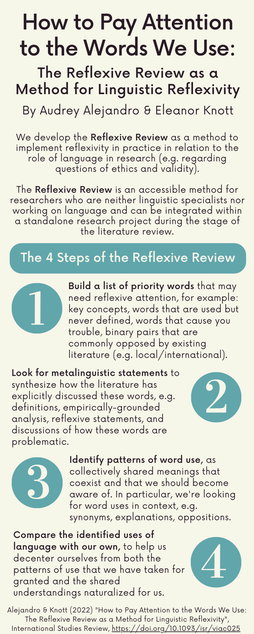|
Interviews in the social sciences
2022, Nature Review Methods Primers (with Aliya Hamid Rao, Kate Summers & Chana Teeger) |
In-depth interviews are a versatile form of qualitative data collection used by researchers across the social sciences. They allow individuals to explain, in their own words, how they understand and interpret the world around them. Interviews represent a deceptively familiar social encounter in which people interact by asking and answering questions. They are, however, a very particular type of conversation, guided by the researcher and used for specific ends. This dynamic introduces a range of methodological, analytical and ethical challenges, for novice researchers in particular. In this Primer, we focus on the stages and challenges of designing and conducting an interview project and analysing data from it, as well as strategies to overcome such challenges.
|
While researchers are reminded to pay attention to how they use words, the methodological and pedagogical tools illustrating how to work on our own use of language are largely missing. To address this gap, this article develops the “Reflexive Review” as a method to enable researchers to implement reflexivity in practice and make more conscious linguistic choices. This method is accessible for researchers who are neither linguistic specialists nor working on language and can be integrated within a standalone research project. The Reflexive review consists of four steps, by reviewing literature to: (1) build a list of “priority words” that may need reflexive attention; (2) look for metalinguistic statements to synthesize how the literature has explicitly discussed these words; (3) identify patterns of word use, as collectively shared meanings that coexist and that we should become aware of; and (4) compare the identified uses of language with our own. This article demonstrates the Reflexive Review in practice based on a word commonly used in IR: “local.”
|
|
Harm, Change and Unpredictability:
The Ethics of Interviews in Conflict Research 2020, Qualitative Research [pdf] (with Denisa Kostovicova) |
Conceiving of interviews as relationships of knowledge-creation involving a researcher and a research participant, we engage with the ethical implications of the unpredictabilities of this relationship when conducting research in conflict and post-conflict contexts. Through a conservative application of the precautionary principle that prohibits change of all involved in the research process, presuming change (always) implies harm, scholars to date have overlooked the ethical challenges that stem from the unpredictability of the interview method. In turn, this perspective has limited our ability to capture and mitigate possible forms of harm, undermining the legitimacy and appropriateness of existing ethical guidelines. We argue for a deliberative and iterative approach to understandings of harm and harm thresholds in interview research.
|
|
Beyond the Field: Ethics After Fieldwork in Politically Dynamic Contexts
2019, Perspectives on Politics [pdf] |
This article considers questions of ethics that arise beyond the field given that political scientists often work in dynamic contexts. I consider the issues of beyond the field in terms of engaging with participants, publishing and returning to the field.
Cited by:
|
